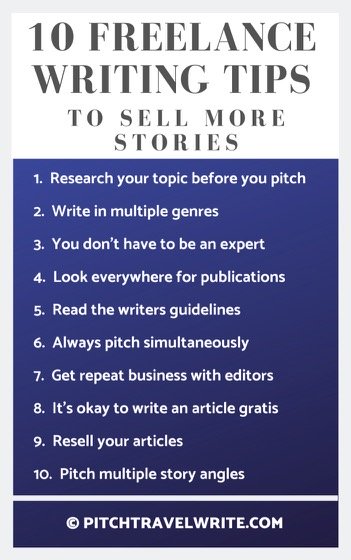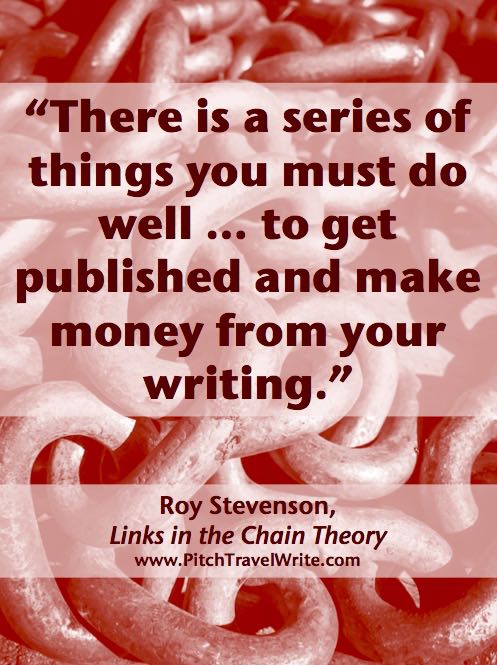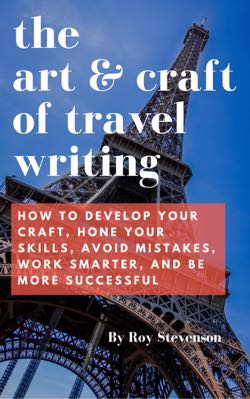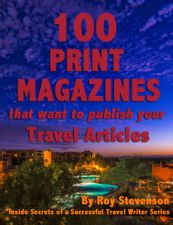- Home
- Getting Published
- Freelance Writing Tips to Get Published
Ten Freelance Writing Tips
to Sell More Stories
By Roy Stevenson
Here are some freelance writing tips that helped me get published prolifically, from the start of my travel writing career. They'll help you get published more frequently, too, and can boost your efforts at breaking into the freelance writing market with your first piece.
But first, a little bit of background.
I’ve always loved writing. Many times I’ve dreamed how great it would be to make a living writing about things and places that interest me.
I started my freelance writing career in September 2007. Little did I realize that within seven months I’d have 101 articles accepted for publication in thirty-four different magazines, websites, newspapers and in-flights.
My work has been published in U.S., Canada, England, Scotland, Australia, New Zealand and the UAE. Three of my articles in the first seven months were cover features. I even had a regular column in one magazine.
How did I get so many articles published in this short time?
Before I started writing, I’d just spent five years traveling in Asia and Europe while my wife was working her corporate job in those places. I was curious to see if I could get some articles published in travel magazines - but had no idea how to do this. I attended a travel writing workshop and it was just what I needed to get started. Shortly after the course, I started pitching.
Editors immediately snapped up my articles. As quickly as I could generate query letters they were buying them at a rate of 3-4 a week. As one editor after another accepted almost every story I pitched, it quickly became apparent that getting published was not difficult.
I set a goal to see how long it would take to get 100 articles accepted for publication. By April 2008 that goal was attained and the number of articles continued to grow. I stopped counting when it hit 1000 articles in more than 200 different media.
Sometimes I’ve had to stop sending out query letters because I had too many articles to write. Every time I send a pitch to editors, I’m 90% certain that my story will be picked up by one of them.
These ten freelance writing tips are a result of all the things I learned during my journey into freelancing. If you apply these techniques you'll find your efforts to get published will improve - even if you're a beginner.
Freelance Writing Tip #1:
Research Your Topic Before Pitching
When you research your topics, your chances of getting your stories published are greatly increased. Using fascinating information gleaned from research in your query letter shows the editor you’re prepared.
Research also pays off when you get the article
accepted. If you've done a good job with your query letter, you’ll already have your rough notes and a few paragraphs written for your story. This early work is not wasted!
Freelance Writing Tip #2:
Write in Multiple Genres
Writing in multiple genres multiplies your chances of getting more articles in print. I’ve had articles appear in travel, culture, military history, history, film festival reviews, writing, communications, running, health, and fitness magazines.
- What are your interests and passions?
- What kind of work and life experiences do you have that you can write about
Consider using as many as possible. This increases your chances of getting published because you'll have a larger population of target publications to query.
Freelance Writing Tip #3:
You Don't Have to be an Expert
You don't have to be an expert to write a good article on a subject. I’ve had articles about military vehicles appear in specialty magazines yet I’m not an expert in this field. But I do have an expert consultant who helps with vehicle identification.
Early on, I had cover feature articles in two nationally distributed U.S. ham radio magazines. Yet I still don’t know the difference between megahertz and UHF. I had an expert give me advice on the communications equipment so I could write the article.
The editors of these two magazines were so pleased with these pieces they asked me to write more.
You don't have to be an expert, but be sure to ask experts for advice.
Freelance Writing Tip #4:
Look Everywhere for Publications to Pitch
Most aspiring writers think the main source for magazine leads is the
Writer’s Market. However, after analyzing my first 100 articles I
discovered only about a third of my magazine leads came from this source.
My two best sources (at 34% each) came from studying the magazine racks at a local bookstores and Internet searches.
Check the better stocked magazine
racks in your town, particularly the specialty magazine stores, or
newsagents. They tend to stock the more offbeat publications that are
generally more “freelancer friendly” than the big glossies on the
supermarket racks.
The Internet can also be the mother lode. It’s
amazing what you’ll find when you search for “travel magazines” or “military
magazines”, or whatever you’re hunting. You’ll find more leads than you
believe possible.
But you should still have a copy of Writer’s Market on your bookshelf. You’ll refer to Writer’s Market after completing your search using these other sources — and you’ll find a few additional magazines sprinkled throughout to add to your “pitch list”.
So don't restrict your search to one source. It's too limiting.
Freelance Writing Tip #5:
Scan the Writers Guidelines Before You Write the Article
The writers guidelines tell you what the editor is looking for in article submissions.
For example, guidelines will tell you what length they prefer their stories to be. Usually the editor tells you in an email what these requirements are when he/she expresses interest in your story.
Too often novice writers obsess over writers guidelines before they send a query letter to an editor. I know beginners who have spent days studying writers guidelines. It's more important to send your queries out first. After an editor is interested in your story, then look at the writers guidelines for the finer points, if the editor has not already communicated them to you.
Not all magazines publish guidelines, so sometimes you’ll have to fly blind. In these cases, indicate you’ll be flexible and work to whatever suggestions the editor wants.
My motto is, “whatever the editor wants, the editor gets.”
Freelance Writing Tip #6:
Always Pitch Simultaneously
Today’s editors realize that freelancers pitch their story ideas simultaneously to many magazines. This is a good thing. It encourages them to jump on your idea quickly if they're interested in your story idea. Otherwise, they might miss out.
If you're unfamiliar with simultaneous submissions, I covered it in a previous article here.
Freelance Writing Tip #7:
Get Repeat Business with Editors
You’ll find once you get an article in a magazine, the editor will be much more receptive to publishing more of your stories. You’re doing well if your repeat rate runs over 50% - meaning over half the magazines that have accepted your pieces accept repeat articles.
Getting repeat business with editors saves you a lot of
time hunting down new magazines and breaking in new editors. Editors
also tend to see it the same way. They prefer reliable writers they know to new writers who haven’t proven themselves.
Freelance Writing Tips #8:
Write an Occasional Article Gratis
It's okay to write an occasional article for free when you're getting started. But never pitch your work as a freebie. Wait until the editor tells
you how they currently don’t have funds to pay freelance writers. Then, if it's a byline you want, offer to give the article to the magazine for free. Once.
An analysis of my first 100 articles shows that 29% were free. This might seem like a lot - but they boosted my portfolio and credibility very quickly.
And free articles can pay off in other ways.
Another benefit of writing the occasional piece gratis is that you’re free to sell it elsewhere. Generally editors don’t retain any rights to free work.
The extra practice you get from writing free articles should never be underestimated. It helps you hone your writing skills and query letters to editors.
Freelance Writing Tip #9:
Resell Your Articles
The life blood of a freelance writer’s income is learning how to recycle articles. Seasoned freelance writers agree reselling your stories is a savvy approach to freelance writing. This is an important key to your continued survival and success as a freelance writer because it's the easiest way to increase your income.
Of my first 100 articles, 74 were originals while the remainder were resales. Recycling your articles opens up a whole new world to you. You'll learn to resell in different countries and different regions.
Reselling your articles also saves you time. Starting a new article from
scratch is very time consuming. By the time you’ve done the research,
written your query letter, and written the piece, a lot of time has passed. Selling the same piece to different
regional magazines or newspapers whose circulation does not overlap is a labor free and inexpensive method to expand into other markets, while boosting your income.
Don’t
forget that after your work has appeared in a newspaper or magazine,
the rights revert back to you (in most cases) and then you’re free to
resell it. Read your contracts and be sure not to sell "all rights" so that you can resell your stories.
Freelance Writing Tip #10:
Pitch Multiple Story Angles
If you have an abundance of material when you’re developing a story,
consider spinning out the concept into two or three different articles.
Pitching
multiple story angles to a variety of publications pays off well. An
article about stretching for runners, for example, can be tweaked into
an article about stretching for athletes generally, and even tweaked
again into an article for fitness buffs.
Some Final Tips:
Don't be afraid to send a blizzard of query letters to magazines. It’s a numbers game. The more queries you send out, the more articles you'll get published.
And don't be afraid to pitch any magazines you think might be interested in your story idea. Sometimes you'll be surprised at the results!
I hear about aspiring writers getting depressed when their query letters are rejected. It’s not personal. All it means is the timing is not right for that story in that publication. Try another publication or a different story idea. Keep pitching.
Try to learn something from every rejection letter, and pay close attention to any comments editors make. You can learn a lot from editors who are gracious enough to give feedback.
Trying some or all of these techniques improves your chances of finding an editor willing to buy your article. These are not difficult techniques - but ignoring any of them significantly reduces your chances of getting published.
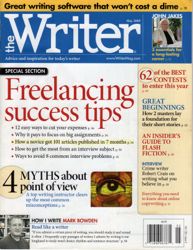
This article was first published in The Writer magazine, May, 2009. It was updated for this website, PitchTravelWrite.com, by Roy Stevenson in 2019.
Related articles that will interest you:
Repurposing Your Freelance Articles
Getting Published: Tips and Resources
Query Letters for Travel Writers

If you don’t know where to find quality websites to help build your online portfolio, or you're looking for a fast list of websites to pitch your stories, I wrote an eBook, 125 Websites That Want to Publish Your Travel Stories.
The 125 websites listed in this eBook are all sites where I would be proud to see my articles published (and many where my articles are published!). More than 50 of these websites pay their writers!

Roy Stevenson is a professional travel writer and the author of www.PitchTravelWrite.com. Over the past ten years, he’s had more than 1000 articles published in 200 magazines, trade and specialty journals, in-flights, on-boards, blogs and websites and has traveled on assignment around the U.S. and to dozens of international destinations.
IF YOU ENJOYED THIS POST, GET UPDATES. IT'S FREE.
